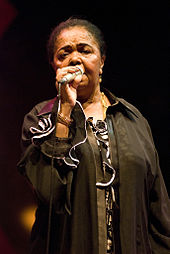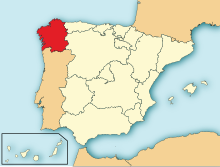Saudade

| Part ofa serieson |
| Emotions |
|---|
  |
| Part ofa serieson |
| Love |
|---|
Saudade(English:/saʊˈdɑːdə/,[1]European Portuguese:[sɐwˈðaðɨ],Brazilian Portuguese:[sawˈdadʒi],Galician:[sawˈðaðɪ],Northeast Brazil:[saw.ˈda.di]; pluralsaudades)[2]is an emotional state ofmelancholicor profoundlynostalgiclonging for abelovedyet absent something or someone. It derives from the Latin word forsolitude.[3]It is often associated with a repressed understanding that one might never encounter the object of longing ever again. It is a recollection of feelings, experiences, places, or events, often elusive, that cause a sense of separation from the exciting, pleasant, or joyous sensations they once caused. Duarte Nunes Leão defines saudade as, "Memoryof something with adesirefor it. "[4]
In Brazil, the day ofSaudadeis officially celebrated on 30 January.[5][6]It is not a widely acknowledged day in Portugal.
History
[edit]
Saudadeultimately derives from the Latinsolitās, solitātem,meaning "solitude"[citation needed].The wordsaudadewas used in theCancioneiro da Ajuda(13th century), in theCancioneiro da Vaticanaand by poets of the time of KingDenis of Portugal[7](reigned 1279–1325). Some specialists argue that the word may have originated during theGreat Portuguese Discoveries,expressing and giving meaning to the sadness felt about those who departed on journeys to unknown seas and often disappeared inshipwrecks,died in battle, or simply never returned. Those who stayed behind—mostly women and children—suffered deeply in their absence. However, the Portuguese discoveries only started in 1415; since the word has been found in earlier texts, this does not constitute a very good explanation. TheReconquistaalso offers a plausible explanation.[citation needed]
The state of mind has subsequently become a "Portuguese way of life": a constant feeling of absence, the sadness of something that's missing, wistful longing for completeness or wholeness and the yearning for the return of what is now gone, a desire for presence as opposed to absence—as it is said in Portuguese, a strong desire tomatar as saudades(lit.to kill the saudades).
In the latter half of the 20th century,saudadebecame associated with the longing for one's homeland, as hundreds of thousands of Portuguese-speaking people left in search of better futures in South America, North America, and Western Europe. Besides the implications derived from a wave of emigration trend from the motherland, historically speakingsaudadeis the term associated with the decline of Portugal's role in world politics and trade. During the so-called "Golden Age", synonymous with the era of discovery, Portugal rose to the status of aworld power,and its monarchy became one of the richest in Europe. But with the competition from other European nations, the country went both colonially and economically into a prolonged period of decay. This period of decline and resignation from the world's cultural coincides with the cultural rising ofsaudadein Portuguese society.
Definition
[edit]TheDicionário Houaiss da Língua Portuguesadefinessaudade(orsaudades) as "A somewhat melancholic feeling of incompleteness. It is related to thinking back on situations of privation due to the absence of someone or something, to move away from a place or thing, or to the absence of a set of particular and desirable experiences and pleasures once lived."[8]
The Dictionary from the Royal Galician Academy, on the other hand, definessaudadeas an "intimate feeling and mood caused by the longing for something absent that is being missed. This can take different aspects, from concrete realities (a loved one, a friend, the motherland, the homeland...) to the mysterious and transcendent. It is quite prevalent and characteristic of the Galician-Portuguese world, but it can also be found in other cultures."
Related words
[edit]Saudade is a word inPortugueseandGalicianthat claimsno direct translationin English. However, a close translation in English would be "desiderium." Desiderium is defined as an ardent desire or longing, especially a feeling of loss or grief for something lost. Desiderium comes from the word desiderare, meaning to long for. Connections between desiderium and nostalgia have also been drawn; the former can be seen as expressing the latter for things that can’t be experienced any more, or things that someone may have never experienced themselves.[9]
In Portuguese, "Tenho saudades tuas"or"Estou com saudades de ti/você"translates as" I have (feel)saudadeof you "meaning" I miss you ", but carries a much stronger tone. In fact, one can havesaudadeof someone whom one is with, but have some feeling of loss towards the past or the future. For example, one can have "saudade" towards part of the relationship or emotions once experienced for/with someone, though the person in question is still part of one's life, as in "Tenho saudade do que fomos" (I feel "saudade" of the way we were). Another example can illustrate this use of the word saudade: "Que saudade!" indicating a general feeling of longing, whereby the object of longing can be a general and undefined entity/occasion/person/group/period etc. This feeling of longing can be accompanied or better described by an abstract will to be where the object of longing is.
Despite being hard to translate in full,saudadehas equivalent words in other cultures, and is often related to music styles expressing this feeling such as thebluesfor African-Americans,añoranzain Spain,Sehnsuchtin German,dorin Romania,Tizitain Ethiopia,Hiraethin Welsh, orAssouffor theTuareg people,appocundria in Neapolitan, ormallin Albanian. In Slovak, the word isclivotaorcnenie,and in Czech, the word isstesk.In Turkish, the wordHasretmeaning longing, yearning or nostalgia has similar connotations, as does the Polish “tęsknota”.
The similar melancholic music style is known inBosnia-Herzegovinaassevdalinkah(from Turkishsevda:infatuation, ultimately from Arabic سَوْدَاء sawdā': 'black [bile]', translation of the Greek μέλαινα χολή, mélaina cholē from which the term melancholy is derived).
Elements
[edit]
Saudadeis similar but not equal tonostalgia,a word that also exists in Portuguese.
In the bookIn Portugalof 1912, A. F. G. Bell writes:
The famous saudade of the Portuguese is a vague and constant desire for something that does not and probably cannot exist, for something other than the present, a turning towards the past or towards the future; not an active discontent or poignant sadness but an indolent dreaming wistfulness.[10]
A stronger form ofsaudademay be felt towards people and things whose whereabouts are unknown, such as old ways and sayings; a lost lover who is sadly missed; a faraway place where one was raised; loved ones who have died; feelings and stimuli one used to have; and the faded, yet golden memories of youth. Although it relates to feelings of melancholy and fond memories of things/people/days gone by, it can be a rush of sadness coupled with a paradoxical joy derived from acceptance of fate and the hope of recovering or substituting what is lost by something that will either fill in the void or provideconsolation.
To F. D. Santos,Saudadeas a noun has become a longing for longing itself:
There was an evolution from saudades (plural) to Saudade (singular, preferably written with a capital S), which became a philosophical concept.... Saudade has an object; however, its object has become itself, for it means 'nostalgia for nostalgia', a meta-nostalgia, a longing oriented toward the longing itself. It is no more the Loved One or the 'Return' that is desired, based on a sense of loss and absence. Now, Desire desires Desire itself, as in the poetry oflove for love's sakein Arabic, or as in Lope de Vega's famous epigram about the Portuguese who was crying for his love for Love itself. Or, rather, as poetess Florbela Espanca put it,I long for the longings I don't have('Anoitecer', Espanca 1923).[11]
In the arts
[edit]Music
[edit]As with all emotions,saudadehas been an inspiration for many songs and compositions. "Sodade"(saudadeinCape Verdean Creole) is the title of theCape VerdesingerCesária Évora's most famous song.Étienne Daho,a French singer, also produced a song of the same name.The Good Son,a 1990 album byNick Cave and the Bad Seeds,was heavily informed by Cave's mental state at the time, which he has described assaudade.He told journalist Chris Bohn: "When I explained to someone that what I wanted to write about was the memory of things that I thought were lost for me, I was told that the Portuguese word for this feeling wassaudade.It's not nostalgia but something sadder. "

The usage ofsaudadeas a theme in Portuguese music goes back to the 16th century,the golden age of Portugal.Saudade,as well as love suffering, is a common theme in manyvillancicosandcantigascomposed by Portuguese authors; for example: "Lágrimas de Saudade" (tears of saudade), which is an anonymous work from theCancioneiro de Paris.Fadois a Portuguese music style, generally sung by a single person (thefadista) along with aPortuguese guitar.The most popular themes of fado aresaudade,nostalgia, jealousy, and short stories of the typical city quarters.Fadoandsaudadeare intertwined key ideas in Portuguese culture. The word fado comes from Latinfatummeaning "fate" or "destiny".Fado is a musical cultural expression and recognition of this unassailable determinism which compels the resigned yearning ofsaudade,a bitter-sweet,existentialyearning and hopefulness towards something over which one has no control.
Spanish singerJulio Iglesias,whose father is aGalician,speaks ofsaudadein his song "Un Canto a Galicia" (which roughly translates as "a song/chant for Galicia" ). In the song, he passionately uses the phrase to describe a deep and sad longing for his motherland, Galicia. He also performs a song called "Morriñas", which describes the Galicians as having a deeply strongsaudade.
The Paraguayan guitaristAgustin Barrioswrote several pieces invoking the feeling ofsaudade,includingChoro de SaudadeandPreludio Saudade.The term is prominent in Brazilian popular music, including the firstBoss a novasong, "Chega de Saudade"(" No moresaudade",usually translated as" No More Blues "), written byTom Jobim. Jazz pianistBill Evansrecorded the tune "Saudade de Brasil" numerous times. In 1919, on returning from two years in Brazil, the French composerDarius Milhaudcomposed a suite,Saudades do Brasil,which exemplified the concept ofsaudade."Saudade (Part II)" is also the title of a flute solo by the bandShpongle.The fado singerAmália Rodriguestypified themes ofsaudadein some of her songs. J-Rock bandPorno Graffittihas a song entitled "サウダージ", "Saudaaji" transliterated ( "Saudade" ). The city pop guitaristMasayoshi Takanakahas an album titled Saudade. The alternative rock bandLove And Rocketshas a song named "Saudade" on their albumSeventh Dream of Teenage Heaven.June 2012 brought Bearcat's release of their self-titled indie album that included a song called "Saudade".
TheDutchjazz/Rock guitaristJan Akkermanrecorded a composition called "Saudade", the centerpiece of his 1996 albumFocus in Time.The Belgian electronic music bandArsenalrecorded a song called "Saudade" on their albumOutsides(2005). The jazz fusion groupTrio Beyond,consisting ofJohn Scofield,Jack DeJohnette,andLarry Goldingsreleased in 2006 an album dedicated to drummerTony Williams(1945–1997), calledSaudades.Dance music artist Peter Corvaia released a progressive house track entitled "Saudade" on HeadRush Music, a sub-label ofToes in the Sand Recordings.New York City post-rock bandMice Paradereleased an album entitledObrigado Saudadein 2004.Chris Reaalso recorded a song entitled "Saudade Part 1 & 2 (Tribute To Ayrton Senna)" as a tribute toAyrton Senna,the Brazilian three-times Formula One world champion killed on the track in May 1994. There is an ambient/noise/shoegazing band from Portland, Oregon, named Saudade. The rock bandExtremehas a Portuguese guitaristNuno Bettencourt;the influence of his heritage can be seen in the band's albumSaudades de Rock.During recording, the mission statement was to bring back musicality to the medium. "Nancy Spain", a song by Barney Rush, made famous by an adaptation byChristy Moore,is another example of the use ofsaudadein contemporary Irish music, the chorus of which is:
"No matter where I wander I'm still haunted by your name
The portrait of your beauty stays the same
Standing by the ocean wondering where you've gone
If you'll return again
Where is the ring I gave to Nancy Spain? "
American singer/songwriterGrayson Hughwrote a song called "Saudade" that he performed with jazz guitarist Norman Johnson on Johnson's 2013 album "Get It While You Can".
Kingston-Upon-Hull IDM Electronica, Downtempo and Deep Groove legend,Steve Cobby,ofFila Brazillia,Solid Doctor, Heights of Abraham, theTwilight Singers debutnotoriety and other musical incarnations and collaborations, released a 12 track album "Saudade"[12]in March 2014 on DÉCLASSÉ Recordings.
Washington DC electronica duoThievery Corporationreleased the studio albumSaudadein 2014 via their Eighteenth Street Lounge Music label.
Brazilian singer Ana Frango Electrico released a song called "Saudade" as the opening track on their 2019 album "Little Electric Chicken Heart".
Composer Cody Matthew Johnson alongside formerSick Puppiesfrontman and singer-songwriterShimwere hired byCapcomto compose the end credits song “Saudade” forResident Evil 2 Remake,later in the year the music was short-played atThe Game Awardsduring the presentation of"The Game Award for Game Of The Year"by "The Game Awards Orchestra".[13][14]
A. R. Rahman's soundtrack for the 2020 Hindi filmDil Becharafeatures an instrumental track called "The Horizon of Saudade".
Icelandic music producerÓlafur Arnaldsreleased the single "Saudade (When We Are Born)" in 2021.
In 2022, Portuguese singerMaroreleased a song called "Saudade, saudade"and represented Portugal with it in theEurovision Song Contest 2022in Turin, Italy.[15]The song placed 9th in the grand final.[16]
Literature
[edit]ThePortugueseauthorFernando Pessoa's posthumous collection of writingsThe Book of Disquietis written almost entirely in a tone of saudade, and deals with themes of nostalgia and alienation.[citation needed]Australian authorSuneeta Peres Da Costa's novellaSaudadefollows Maria, a young girl from a Goan immigrant family, growing up in a political hierarchy of racism and colonialism[17]
Film and television
[edit]In an episode of the Colombian telenovelaYo soy Betty, la fea,Brazilian actressTaís Araújo(guest-starring as herself) discussed the concept of saudade with the heartbroken titular character.
Variations
[edit]
Saudadeis also associated withGalicia,where it is used similarly to the wordmorriña(longingness). Yet, morriña often implies a deeper stage ofsaudade,a "saudadeso strong it can even kill, "as the Galician saying goes. Morriña was a term often used by emigrant Galicians when talking about the Galician motherland they left behind. Althoughsaudadeis also a Galician word, the meaning oflonging for something that might returnis generally associated withmorriña.A literary example showing the understanding of the difference and the use of both words is the songUn canto a GaliciabyJulio Iglesias.The word used by Galicians speaking Spanish has spread and become common in all Spain and even accepted by theAcademia.[18]
In Portugal,morrinhais a word to describe sprinkles, whilemorrinharmeans "to sprinkle." (The most common Portuguese equivalents arechuviscoandchuviscar,respectively.)Morrinhais also used in northern Portugal for referring to sick animals, for example of sheepdropsy,[18]and occasionally to sick or sad people, often with irony. It is also used in some Brazilian regional dialects for the smell of wet or sick animals.
InGoa,India,which was a Portuguese colony until 1961, some Portuguese influences still remain. A suburb ofMargão,Goa's largest city, has a street named Rua de Saudades. It was aptly named because that very street has the Christian cemetery, the Hindushmashana(cremation ground) and the Muslimqabrastan(cemetery). Most people living in the city of Margão who pass by this street would agree that the name of the street could not be any other, as they often think fond memories of a friend, loved one, or relative whose remains went past that road.
InCape Verdean Creolethere is the wordsodadi(also spelledsodade), originated in the Portuguesesaudadeand exactly with the same meaning.
See also
[edit]References
[edit]- ^"Saudade".LexicoUK English Dictionary.Oxford University Press.Archived fromthe originalon 9 May 2020.
- ^Priberam Informática, S.A."Significado / definição de saudade no Dicionário Priberam da Língua Portuguesa".Archivedfrom the original on 8 November 2009.Retrieved14 January2010.
- ^Pap, Leo (1 April 1992)."On the etymology of Portuguese SAUDADE: an instance of multiple causation?".WORD.43(1): 97–102.doi:10.1080/00437956.1992.12098282.ISSN0043-7956.
- ^"MEMORANDUM 08 - NASCIMENTO A.R.A e MENANDRO P.R.M."fafich.ufmg.br.Archivedfrom the original on 22 April 2018.Retrieved30 January2016.
- ^"Portoweb - Datas Comemorativas".Archivedfrom the original on 24 July 2011.Retrieved30 January2010.
- ^"Dia da Saudade. Origem e curiosidades sobre o Dia da Saudade - Brasil Escola".Brasil Escola.Archivedfrom the original on 13 February 2010.Retrieved30 January2010.
- ^Basto, Cláudio. "Saudade em português e galego".Revista Lusitana,Vol XVII, Livraria Clássica Editora, Lisboa 1914.
- ^Dicionário Houaiss da língua portuguese(Brazilian Portuguese Dictionary).
- ^"Desiderium, and More Obscure Feeling Words".merriam-webster.Retrieved11 January2020.
- ^Bell, A. F. (1912)In Portugal.London and New York: The Bodley Head. Quoted inEmmons, Shirleeand Wilbur Watkins Lewis (2006)Researching the Song: A Lexicon.Oxford and New York: Oxford University Press, p. 402.
- ^Santos, Filipe D. (2017).Education and the Boarding School Novel, The Work of José Régio.Rotterdam: Sense Publishers. p. 102.ISBN978-94-6300-739-9.Archivedfrom the original on 4 September 2017.Retrieved3 September2017.
- ^"Saudade, by Steve Cobby".Déclassé Recordings.Archivedfrom the original on 15 April 2017.Retrieved15 April2017.
- ^Cody Matthew Johnson [@codymatthewj] (28 January 2019)."Eager to announce I wrote the song" Saudade (feat. Shim) "credits of Resident Evil 2 — exclusively available in game and digitally at a later date"(Tweet) – viaTwitter.
- ^Cody Matthew Johnson [@codymatthewj] (14 December 2019)."Last night at @thegameawards TGA orchestra played an incredible (and nearly 2x tempo!) arrangement of my song" Saudade "for Resident Evil 2's nom for GOTY! I had absolutely no idea this was going to happen - a total and pleasant surprise!"(Tweet) – viaTwitter.
- ^Land, Teddy (13 March 2022)."MARO will represent Portugal at Eurovision 2022 with 'saudade, saudade'".aussievision.net.
- ^"MARO - Portugal - Turin 2022".Eurovision.tv.Retrieved15 May2022.
- ^Saudade, Peres Da Costa, Giramondo Publishing, March 2018https://giramondopublishing /product/saudade/Archived18 March 2018 at theWayback Machine
- ^abmorriñaArchived13 February 2013 atarchive.todayin the Spanish-languageDiccionario de la Real Academia.
Further reading
[edit]- Lourcenço, Eduardo (1999).Mitologia da saudade (Seguido de Portugal como destino)(in Portuguese).São Paulo:Companhia das Letras.ISBN85-7164-922-7.
- Rappa, Antonio L.Saudade: The Culture and Security of Eurasians in Southeast Asia.Ethos Books andSingapore Management University's Wee Kim Wee Centre, 2013.
- Ribeiro, Bernardim (Torrao, ~1482 – Lisboa, ~1552).Livro das Saudades(in Portuguese).
External links
[edit]- Emotion as Collective Identity: the case of Portuguese Saudade, Marcia Esteves Agostinho, Academia Letters, February 2021
- Aesthetics of Saudade – Essay comprising the major theories and explaining the doubts surrounding the translation of saudade
- "BBC Brasil":Saudadeis the 7th most difficult word to translate(in Portuguese), London: BBC, 23 June 2004.
- saudade, dictionary

